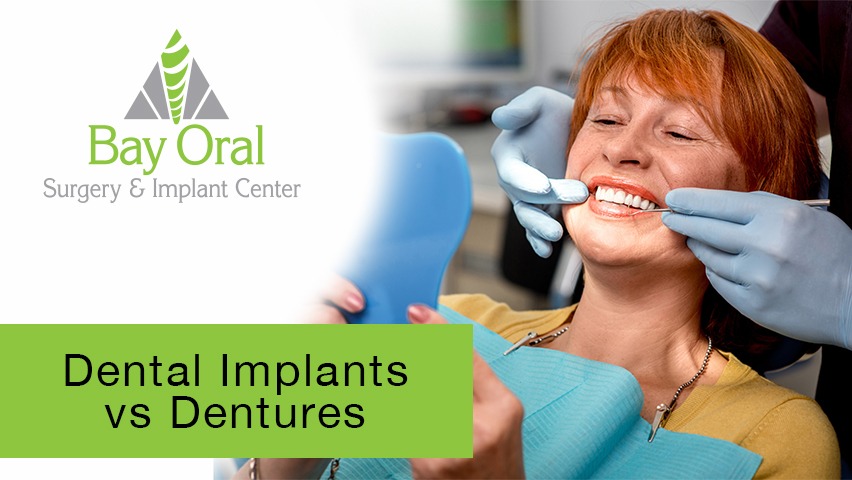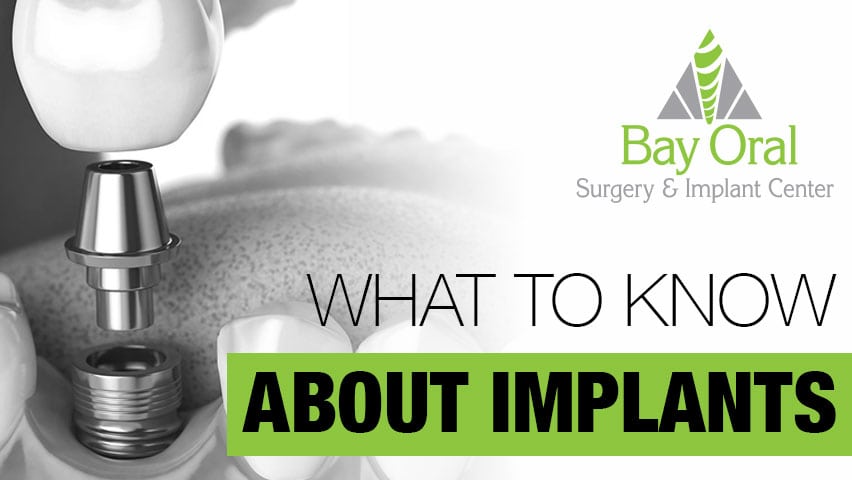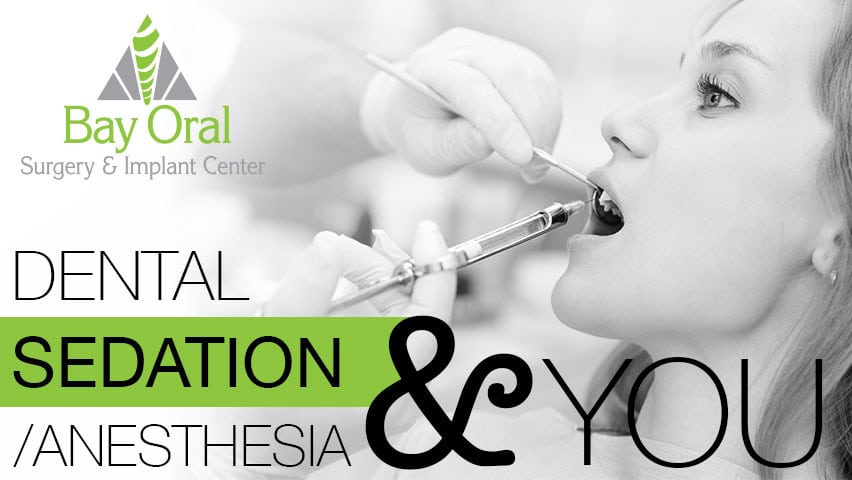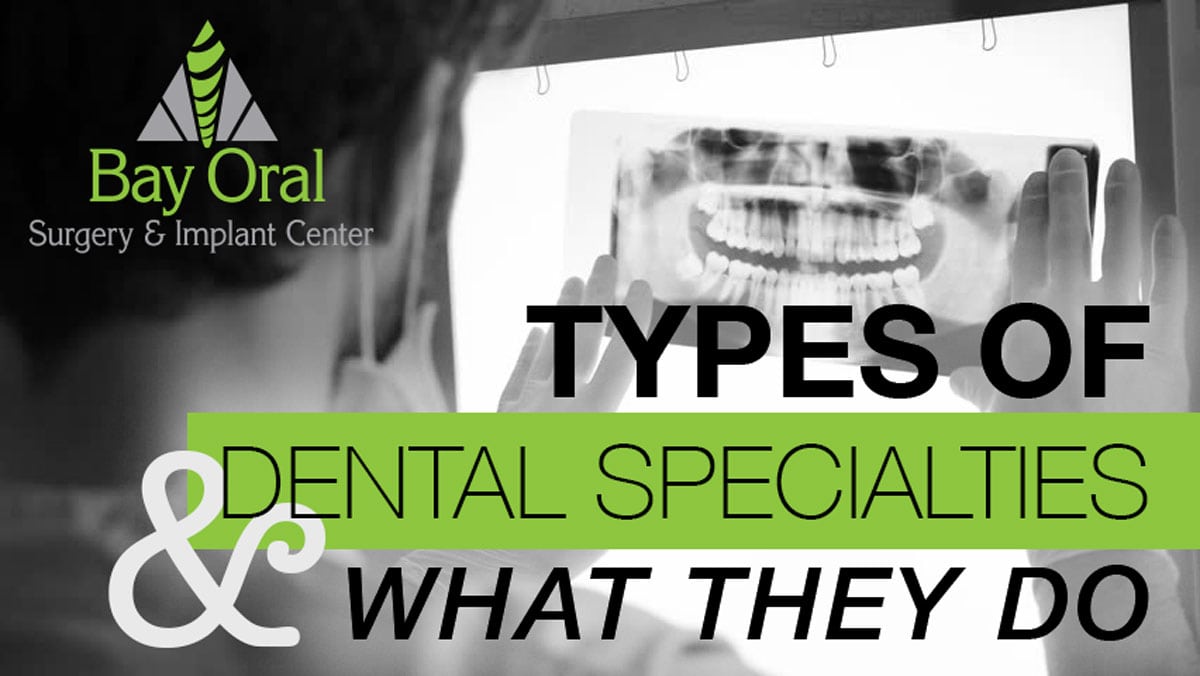
by Bay Oral Surgery | May 21, 2024 | Blog, Implants
 It’s not uncommon to have missing teeth nowadays. According to the American Academy of Implant Dentistry, nearly 70 percent of adults aged 35 to 44 have at least one missing tooth, and 1 in 4 people over the age of 74 are missing all their teeth. Dental implants and dentures are the most common options available to replace missing or decaying teeth, but which is the right option for you? Truth be told, there isn’t a “right option” for everyone. Learn about the differences between dental implants and dentures below to make your own educated decision.
It’s not uncommon to have missing teeth nowadays. According to the American Academy of Implant Dentistry, nearly 70 percent of adults aged 35 to 44 have at least one missing tooth, and 1 in 4 people over the age of 74 are missing all their teeth. Dental implants and dentures are the most common options available to replace missing or decaying teeth, but which is the right option for you? Truth be told, there isn’t a “right option” for everyone. Learn about the differences between dental implants and dentures below to make your own educated decision.
Dental Implants vs. Dentures
A dental implant is a surgical component that is anchored directly to the jawbone to provide greater stability and support for one or more artificial teeth, called crowns. It acts like tooth roots and the only dental restoration option that preserves natural bone, actually helping to stimulate bone growth and maintain facial structure. Implants are designed to provide a foundation for replacement teeth that look, feel, and function like natural teeth. On the other hand, a denture is a removable replacement for missing teeth and surrounding tissues that can be taken out and put back into your mouth. It can take a couple of weeks or even months to get used to new dentures. At first, they might feel bulky or loose as the muscles of your cheeks and tongue learn to hold your dentures in place. Dentures often slip and move around, causing discomfort, irritating your gums, and making chewing more difficult. Dentures also need to be removed regularly for cleaning and proper care. Dentures are the more affordable option for tooth replacement; however, they are often less effective and can end up costing more in the long-term. Once you add up the costs of buying fixatives, cleaning solutions and replacements, the cost of dentures goes up. Dental implants are a long-lasting solution, whereas dentures will eventually need to be remade or relined due to wear and your mouth naturally changing over time. Implants are easier to maintain compared to dentures and lead to fewer dentist visits. For these reasons, more and more people are choosing dental implants over dentures as a solution for teeth restoration.
What’s Right For You?
The “right option” is different for every patient. After an initial consultation with your implant dentist, you will be provided with a treatment plan that includes the estimated amount of time and costs associated with your tooth replacement option. The length of time and costs will vary depending on your specific needs, medical and dental history, the condition of your jawbone, and the materials used. Find a dentist to schedule your consultation or contact us to learn more.

by Bay Oral Surgery | Dec 15, 2018 | Blog, Implants

Dental and oral traumas are relatively common occurrences. The most common causes are physical injury due to a fall, sports related injury, and motor vehicle accident.
For a pediatric (child) patient, falls are common when first learning how to walk. Most coffee tables happen to be about the height of a child of that age, making it a common point of contact. This can cause injury to either the soft tissue, such as the lip, gingiva (gum) and tongue, or the hard tissue, such as the bone or teeth.
Dental and oral injuries differ in their severity and their management. Therefore, a professional evaluation is needed. The dentist is usually the first point of contact to proper management of these injuries. Generally speaking, when a dentist feels that the extent of injury requires a higher level of intervention, the patient is referred to an Oral and Maxillofacial Surgeon for definitive treatment.
Important things to know about dental and oral injury:
1. If there is bleeding, applying pressure to the bleeding area will help to slow and stop the bleeding. Pressure can be applied using sterile gauze, which are usually available commercially at the pharmacy.
2. Timing of injury is important. The sooner the patient seeks care, the less blood loss and the better the outcome of the intervention will be.
Management of a tooth:
- If a tooth is injured and has some mobility (loose tooth), do not attempt to remove it. A tooth’s natural environment is the oral cavity. However, the patient needs to be very careful as having a loose tooth can make it a risk for swallowing it by the patient.
- If the tooth is dislodged out of the mouth, attempt to find the tooth. The tooth should be kept in the appropriate environment to be able to rescue it. There are many commercially available products to place a tooth in if it gets dislodged, such as Save – A – Tooth preserving system. If no solution is present, keeping a tooth in a small container in the patient’s own saliva is reasonable until the patient receives care.
- Do not dry the tooth! Some patients may hold the dislodged tooth and dry it with a tissue; this will dehydrate the tooth and minimize the chances of its survival.
- Do not place the tooth in water. The tooth requires an electrolyte balanced solution, such as saliva or commercial products designed to help preserve the vitality of tooth. Water is NOT an adequate environment for this.
Management of the patient:
- The oral health provider will perform an evaluation of the patient’s injury and review the patient’s medical history. Based on this evaluation, a unique plan for the proper management of the patient should be developed.
- In the case of a dental injury, generally speaking, a determination to know if a tooth is salvageable or not is needed. If the tooth is salvageable then it may require some form of fixation to keep it in the proper position for healing to occur. Time of fixation should be determined by the oral health provider. Primary teeth (baby teeth) are not usually repositioned if they are dislodged.
- If a tooth is not salvageable then it may require extraction and possible management of adjacent tissues in preparation of future replacement.
- Soft tissue injury usually requires careful inspection to remove any debris and determine the layers involved. After proper debridement and cleansing of the tissue and management of any bleeding, the tissue may require suturing for healing to occur.
- The oral health provider will determine the need for any pharmacologic agents, such as antibiotics, analgesics, ointments, or mouth rinses.
- Patients are usually instructed to remain on a soft diet to prevent repeat trauma to the tissue to allow proper healing to occur. There are usually detailed instructions provided by the oral health provider on how to do that.
Long term follow-up and future intervention may be required, such as root canal therapy, restorations, and management of occlusion or discoloration.

by Bay Oral Surgery | Dec 6, 2018 | Blog, Implants

Four Ways Dental Implants Can Improve Your Life
Although there are several treatment options for damaged or missing teeth, dental implants provide a number of benefits that make for a better long-term investment overall.
1. Dental implants are a long-term solution.
Because dental implants are anchored directly to the jawbone, they provide greater stability and can last long-term with proper care.
2. Dental implants help preserve your natural smile.
Dental implants help preserve facial structure, preventing bone deterioration that occurs when teeth are missing. Implants are designed to provide a foundation for replacement teeth that look, feel, and function like natural teeth.
3. Dental implants restore function more effectively.
Because implants actually fuse with your bone over time and act like tooth roots, they provide a solid foundation to regain the ability to eat your favorite foods. Dental implants aid in the replacement of missing teeth without the need to involve other natural teeth, such as that of a bridge, or the possibility of losing a removable appliance.
4. Dental implants offer greater lifestyle convenience.
After proper healing, you can care for dental implants just like your natural teeth. With healthy dental hygiene habits and regular flossing, dental implants can last a long time and lessen your dental care worries.
If you are interested in replacing your tooth with a dental implant, please contact Bay Oral Surgery & Implant Center at 920-499-0471 to schedule a consultation.
Schedule an appointment

by Bay Oral Surgery | Oct 15, 2018 | Blog, Implants

For many people, the decision to get dental implants may seem daunting. Some may think dental implants are purely cosmetic and costly. For others, the procedure may sound frightening with a long and painful recovery period.
The truth is that dental implants provide much more than a great smile. In fact, dental implants can play an integral role in maintaining oral health. When a tooth is missing, implants can help preserve facial structure and prevent bone deterioration. Also, after the loss of a tooth, adjacent teeth can shift, creating a gap that becomes a potential breeding ground for bacteria.
Cost is another factor when considering dental implants. Although the procedure is usually more expensive than a bridge or a crown, the results are permanent. The implants are actually anchored directly to the jaw bone, creating a strong foundation for artificial teeth. This means that the implant will not require additional maintenance or replacement.
Finally, for some, the fear factor may be the biggest consideration for dental implants. In reality, dentists use an anesthetic during the procedure and patients experience little to no discomfort. For most patients, over-the-counter medications are effective in managing pain following the procedure. This means that dental implants aren’t nearly as painful as many would expect. And, having a winning smile doesn’t hurt either.

by Bay Oral Surgery | Aug 10, 2018 | Blog, Implants, Wisdom Teeth

There are three main types of sedation used in oral surgery; local anesthetic, IV sedation, and general anesthesia. It’s important to remember, with Bay Oral Surgery & Implant Center – all of our services are surgical in nature and will require some type of anesthesia, for that reason we think it’s important that you understand the different types of anesthesia commonly used in oral surgery. What they are, what they do and what type of dental anesthesia is right for your procedure.
Local
A local anesthetic is typically what you will find at your dentist office, having a tooth removed or having a cavity filled. It’s an injected drug that will temporarily numb a small area. While you will remain awake and aware during the procedure this type of anesthesia blocks the communication of your nerves to pain receptors in your brain, making you much more comfortable during a procedure.
Intravenous (IV) sedation
IV sedation is, as the name implies, typically taken through a vein. It works quickly to promote a sleep like state. Unlike General Anesthesia, you are still conscious with IV sedation and able to respond to visual signals. However, when you “wake up” after the procedure you will not remember any of it and will be quite groggy. Because of this, we require all patients to secure a safe ride home after any surgery and don’t recommend driving for at least 24 hours. IV sedation does not control pain so you can expect it to be used in combination with a local anesthetic.
General Anesthesia
General anesthesia uses a combination of IV and inhaled gasses to make a patient completely unconscious during a procedure in the hospital setting. Patients are unable to respond or feel any pain. This type of anesthesia is absolutely necessary for complex and traumatic dental surgeries, such as facial fractures, and is only administered in the hospital setting by an anesthesiologist.
Check out this page on our website for what to do and what not to do when preparing for sedation at Bay Oral Surgery & Implant Center. https://bayoralsurgery.com/sedation/ Contact us, if you have any questions or concerns about the sedation you will be receiving or the pre-op instructions.

by Bay Oral Surgery | Mar 19, 2018 | Blog, Implants, Wisdom Teeth

Not all dentist’s are created equal, but they all have a common goal, helping you have and keep a healthy mouth. Find out the different types of dental specialties and exactly what they do.
Pedodontics – Pediatric Dentist
While general dentists are allowed to treat patients of any age, pediatric dentists are specially trained to address specific needs and oral health of children and teens, like flouride treatments and dental sealants. Pediatric dentists will guide children and teens through their dental growth and development utilizing their training from infant oral health exams to space management after the premature loss of a primary tooth. They also offer other oral health related care like special counseling on nutrition, advice on teeth grinding, and discouragement of thumb and finger sucking.
Endodontist – The Tooth Root Doctor
Need a root canal? Endodontists are highly trained in the normal functions, causes and effects of dental disease and the relationship between the two, concerning the human dental pulp – that is, the center of the tooth, made up of living connective tissue and cells. And the tissues surrounding the root. They focus on prevention and treatment of injuries or diseases of the dental pulp; including pulpitis, “pulp stones”, or pulp exposure – all of which can be extremely painful or can lead to dental abscesses. Common treatment for dental pulp disease is the root canal therapy.
Oral & Maxillofacial Surgeons are orthopedic facial surgeons treating a wide variety of dental issues, from removal of impacted teeth, to dental implants, and reconstructive facial surgery. This specialty diagnoses and treats diseases, injuries and defects of both hard and soft tissue in the oral (mouth) and maxillofacial (jaw and face) region.
Our team, at Bay Oral Surgery & Implant Center, which includes Board Certified surgeons, practices a full scope of Oral and Maxillofacial surgery and have specialties ranging from corrective jaw surgery to wisdom tooth removal and dental extractions. We also diagnose and treat facial pain, facial injuries, and TMJ disorders; and perform a full range of dental implant and bone grafting procedures.
Orthodontist – The Alignment Dentist
Orthodontics deals with the diagnosis and treatment of misaligned or malpositioned teeth or jaws. Orthodontic dentists will correct misalignment of teeth, gaps, overbite or underbite, or other abnormalities of the jaw, bite or teeth, using non-surgical procedures. Correcting the bite and alignment of teeth will improve your smile but also affects the function and longevity of the teeth. There are a variety of orthodontic treatments including wires, braces, retainers, Invisalign® or other corrective appliances.
Periodontist – The Gum Specialist
Of all dental specialties, periodontists are dentists specializing in the care and prevention of gum-related diseases and the treatment of oral inflammation. Periodontists often treat more problematic cases or severe gum disease with a wide range of treatment including scaling and root planing – which is commonly thought of as a “Deep Cleaning” and involves thoroughly scaling all plaque, toxins and tartar deposits and then smoothing all of the rough areas on the root surface. Another common treatment would be root surface debridement, where damaged gum tissue is removed.
Periodontists are also specially trained in placement, maintenance and repair of dental implants.
Prosthodontist – The Restoration Dentist
A prosthodontist is certified in restoration and replacement of broken or missing teeth. Using crowns, bridges, or dentures, prosthodontists understand the dynamics of a smile and are trained to create replacements to address the oral function, comfort, appearance and oral health of patients with missing or deficient teeth. They also are one of the dental specialties that work in post oral cancer reconstruction, jaw joint problems, traumatic mouth injuries, and snoring and sleep disorders.

 It’s not uncommon to have missing teeth nowadays. According to the American Academy of Implant Dentistry, nearly 70 percent of adults aged 35 to 44 have at least one missing tooth, and 1 in 4 people over the age of 74 are missing all their teeth. Dental implants and dentures are the most common options available to replace missing or decaying teeth, but which is the right option for you? Truth be told, there isn’t a “right option” for everyone. Learn about the differences between dental implants and dentures below to make your own educated decision.
It’s not uncommon to have missing teeth nowadays. According to the American Academy of Implant Dentistry, nearly 70 percent of adults aged 35 to 44 have at least one missing tooth, and 1 in 4 people over the age of 74 are missing all their teeth. Dental implants and dentures are the most common options available to replace missing or decaying teeth, but which is the right option for you? Truth be told, there isn’t a “right option” for everyone. Learn about the differences between dental implants and dentures below to make your own educated decision.




